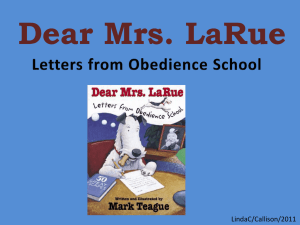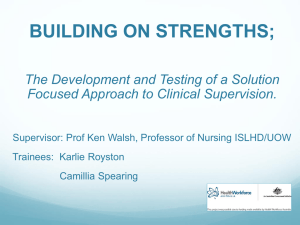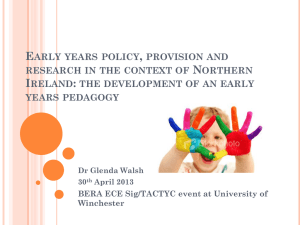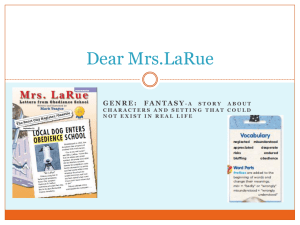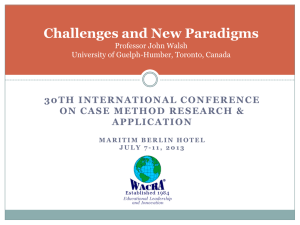Sue Walsh and Sharon Warden
advertisement
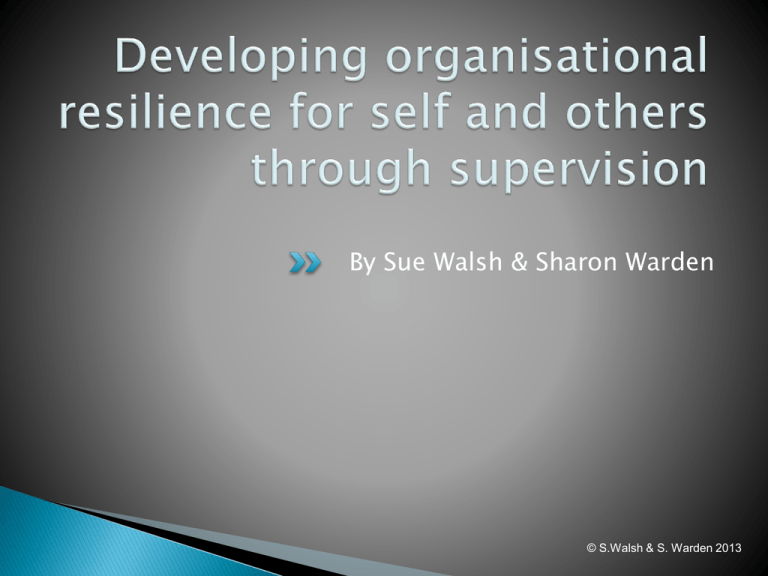
By Sue Walsh & Sharon Warden © S.Walsh & S. Warden 2013 Values, peoples and structures Digesting current NHS organisational processes/dynamics: in the service of your own learning needs; and to enhance your supervision of others Taking you through a set of ideas, concepts that we have found useful in our own practice (healthcare culture, pulls to perversion and resilience) Set up your learning groups-get into a pair, when ready make a four (what suits you? Familiarity or stranger group?) © S.Walsh & S. Warden 2013 Sharon: Healthcare culture, understanding the dynamics of “the perfect storm” The analogy of the perfect storm Failure to thrive healthcare cultures & the pull to perversion An organisational Case example ‘Therapeutic alliance’ as model for resilience © S.Walsh & S. Warden 2013 Current NHS conditions ripe for the ‘perfect storm’? Industrialisation of healthcare Commodity relationship - consumer / Provider couple Financial cuts and survival angst Increasing demands of population changes (eg: age, obesity rise in chronic conditions) © S.Walsh & S. Warden 2013 ‣ A small group struggling to survive in a large organisation struggling to survive in a climate of severe cuts ‣ Embattled Perception of the small “unwanted” group © S.Walsh & S. Warden 2013 ‣ Staff feel devalued, demoralised, frustrated & afraid (survival anxiety – fight, flight, freeze) ‣ Suspicious of “hidden organisational agenda” ‣ Risk of “repetition compulsion” self defeating replaying old wounds (split between Psychology / Psychotherapy) © S.Walsh & S. Warden 2013 Do the ideas make sense? Have you experience of these processes? Through your own supervision & of others? © S.Walsh & S. Warden 2013 © S.Walsh & S. Warden 2013 Leads to an attack on the capacity to relate (“kin”) reduced reflective function due overwhelming survival anxieties. © S.Walsh & S. Warden 2013 Overwhelming “survival anxieties” / fear Disconnection - not seeing the ‘whole picture’ Forgetting – ‘slips’ Shut down - “turning a blind eye” Magical thinking – “obsessions” Punitive / moralistic concerns or judgements © S.Walsh & S. Warden 2013 What is happening when things go wrong? What frameworks/ ideas can we hold in mind to help us digest “the perfect storm” Recent examples of failures – Mid Staffs & Winterbourne & Norfolk © S.Walsh & S. Warden 2013 Individual pleasure at expense of general good Knowing & not knowing (turning a blind eye) Instrumental relations are dominant – others seen as ‘things/objects’ opens possibility of abuse Engagement of others in system Once engaged others are corrupted because they become accomplices Can you apply these concepts to your work environment if so in what ways? ‣ Containing anxieties: the “safe harbour” function ‣ Integrating splits ‣ Staff can become “irradiated by distress” of work © S.Walsh & S. Warden 2013 Atmosphere Culture Attuned links Space to reflect Emotionally intelligent anticipation of failure Culture of curiosity – “duty of candour” © S.Walsh & S. Warden 2013 Therapeutic Alliance Evidence based Promotes change Predicts outcome Fosters resilience © S.Walsh & S. Warden 2013 Sue: Resilience and supervision “It is written that when you do not have hope you look for it in the face of your friend” Gazan man quoted by Gordon (2009) The word ‘solitude’ expresses the glory of being alone, whereas the word ‘loneliness’ expresses the pain of feeling alone. (Tillich, 1959 as quoted by Cacioppo et al 2010) © S.Walsh & S. Warden 2013 To consider the literature on resilience To reflect on individual, organisational and social resilience To connect this literature up with our supervisory practice both in terms of what we give others and what supervision we have for ourselves © S.Walsh & S. Warden 2013 “resilience has been defined as successful adaptation or absence of pathological outcome following exposure to stressful or potentially traumatic life events or life circumstances” Seery et al 2010 maintaining a healthy outcome in the context of adversity and the capacity to rebound after a negative experience Most people experience adversity in their life yet most of us rebound © S.Walsh & S. Warden 2013 Is it about recovering from adversity (baseline functioning) or is it about deriving a greater capacity for future resilience? A positive toughening effect when exposure is limited with time to recover. This toughness leaves individuals more emotionally stable, better able to cope. Once toughness develops can permeate to other domains Moderate adversity predicts better mental health than either high levels or no adversity © S.Walsh & S. Warden 2013 ◦ A clear acceptance of reality ◦ A clear value system- that life is meaningful ◦ An ability to improvise ◦ (taken from Coutu 2002 Harvard Business Review) © S.Walsh & S. Warden 2013 ◦ Facing down reality ◦ The search for meaning (not necessarily ethically minded - Barclays, cohesive identity of the group) ◦ Ritualised Ingenuity- ‘bricolage’ © S.Walsh & S. Warden 2013 e.g. Caioppo, Reis and Zautra 2011 Individual achievements vs collective action “social resilience is the capacity to foster, engage in and sustain positive relationships and to endure and recover from life stressors and social isolation” © S.Walsh & S. Warden 2013 Adversity into strengthening social engagements, developing new relationships, collective action, emphasizes an individual’s capacity to work with others and therefore to enhance the groups capacity to do so ‘Social’ –building more adaptive social ecologies for people/organisations, groups © S.Walsh & S. Warden 2013 Are there additional issues for the caring profession? Holding Fast (2005) Kahn Not too close or too far away A paradoxical stance needs to be maintained of being open to others and detached from those we help © S.Walsh & S. Warden 2013 How do you create the conditions for resilient supervision? (personally and professionally) © S.Walsh & S. Warden 2013 ‣ In caregiving environments members generate with one another the experience of being contained and provided for… ◦ Primary task as integrating mechanism ◦ Integrity of roles and authority ◦ Structural interdependence Yet these things are very difficult to do well in the context of current fragmentation © S.Walsh & S. Warden 2013 Pick a case/issue with you as supervisee or as supervisor (that you don’t think is going well). Using the previous 3 exercises, what factors may help you to understand what changes need to be made to your supervision? In line with social resilience prepare your feedback for wider group © S.Walsh & S. Warden 2013 Facing a reality ◦ Not being alone- making connections ◦ Being prepared to prioritise yourself and your learning (including being prepared to pay for supervision) ◦ Anxiety about revealing your work and having ‘your mistakes’ seen © S.Walsh & S. Warden 2013 © S.Walsh & S. Warden 2013

